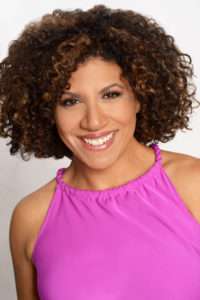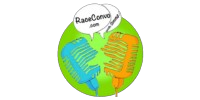On this episode of Everyday Conversations on Race for Everyday People, we talk about racism in Hollywood with Damona Hoffman. Damona is a dating coach & media personality who starred in two A+E Networks’ TV series: #BlackLove and A Question of Love. She’s a contributor for The Washington Post, CNN Headline News (HLN), Match.com, BET.com, and more. Previously, Damona held creative executive & diversity positions at CBS, Paramount, and NBC Universal. Now, she hosts and produces two podcasts, I Make a Living (by FreshBooks) and Dates & Mates with Damona Hoffman.
Damona talks with me about what it was like growing up Black and Jewish with an African American mother and white Jewish father.

Her first awareness and experience with direct racism and hate. was when she was 16 years old. “My friend took me to a party where I was the only Black person. A white guy holding a hockey stick kept pointing at people and asking them their name. When he pointed the stick at me, she said, “N……, Bitch that what we call all of you.”
She felt f threatened- scared, and shocked. When she jumped up and told her friend they had to go, the friend said she was over reacting.
For Damona Hoffman, this was the moment for her that every person of experiences when they know that things will never be the same. And this is another reason why conversations on race are so crucial because too often, people who are not Black or not people of color do not understand how serious racism is.
Key learning
Those of us who are white need to understand that racism doesn’t go away on its own. If you’re in a situation where you hear a racist statement, see a racist action or witness a person of color being targeted, we have to speak up. We have to intervene. If we claim to be against racism or anti-racist, we need to back up our words with action. If we don’t, we are colluding, and if we say nothing, we are colluding. Silence equals consent. Do not leave it up to the person of color to have to be a lone voice. In those cases, you are either part of the solution you are the problem.
It might be dangerous for a person of color to say something
Damona was lucky she got out, but she wanted the friend to speak out and instead her friend made her feel more unsafe.
Being Black, Jewish, and bi-racial helps her connect with people on many levels. There are also times when she gets excluded.
Listen to the rest of the podcast to hear more from Damona Hoffman
- When she feels included and when she thinks people look at her like she’s an enemy.
- Issues of colorism in the Black community and how she worked through it
- Thoughts on internalized racism and oppression
- How she launched talent diversity programs at NBC and CBS
- Experience and speaking out against microaggressions in Hollywood
- About her starring role in “Black Love” on A&E

